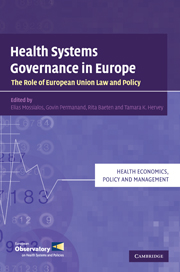Book contents
- Frontmatter
- Contents
- List of figure
- List of tables
- List of boxes
- List of contributors
- Foreword
- Acknowledgments
- List of abbreviations
- 1 Health systems governance in Europe: the role of European Union law and policy
- 2 Health care and the EU: the law and policy patchwork
- 3 EU regulatory agencies and health protection
- 4 The hard politics of soft law: the case of health
- 5 Public health policies
- 6 Fundamental rights and health care
- 7 EU competition law and public services
- 8 EU competition law and health policy
- 9 Public procurement and state aid in national health care systems
- 10 Private health insurance and the internal market
- 11 Free movement of services in the EU and health care
- 12 Enabling patient mobility in the EU: between free movement and coordination
- 13 The EU legal framework on e-health
- 14 EU law and health professionals
- 15 The EU pharmaceuticals market: parameters and pathways
- Bibliography
- Index
12 - Enabling patient mobility in the EU: between free movement and coordination
Published online by Cambridge University Press: 04 August 2010
- Frontmatter
- Contents
- List of figure
- List of tables
- List of boxes
- List of contributors
- Foreword
- Acknowledgments
- List of abbreviations
- 1 Health systems governance in Europe: the role of European Union law and policy
- 2 Health care and the EU: the law and policy patchwork
- 3 EU regulatory agencies and health protection
- 4 The hard politics of soft law: the case of health
- 5 Public health policies
- 6 Fundamental rights and health care
- 7 EU competition law and public services
- 8 EU competition law and health policy
- 9 Public procurement and state aid in national health care systems
- 10 Private health insurance and the internal market
- 11 Free movement of services in the EU and health care
- 12 Enabling patient mobility in the EU: between free movement and coordination
- 13 The EU legal framework on e-health
- 14 EU law and health professionals
- 15 The EU pharmaceuticals market: parameters and pathways
- Bibliography
- Index
Summary
Introduction
Free movement of patients – or patient mobility, as it is commonly referred to – implies people accessing health care services outside their home state. Although health care normally is delivered close to where people live, in some instances the need for medical care arises while away from home or patients decide to seek care elsewhere. Patients’ readiness to travel for care, especially across borders, is determined by a mix of factors linked to the specific situation of the patient, to the specific medical needs and to availability of care at home and abroad. Motivations for travelling abroad for care vary from the search for more timely, better quality or more affordable health care to treatment responding better to the patient's wants or needs – including when care is inexistent or even prohibited at home.
While citizens in the EU, in principle, are free to seek health care wherever they want and from whatever provider available, in practice this freedom is limited by their ability to pay for it or by the conditions set out by public and private funding systems for health care. Traditionally, countries have confined statutory cover for health care delivered to their population to providers established in their territory. Whereas initially, bilateral conventions derogated from this territoriality principle to ensure access to care for people living and working in different Member States, a more general derogation was established in the context of European integration under Article 42 EC, based on the fundamental principle of free movement of persons.
- Type
- Chapter
- Information
- Health Systems Governance in EuropeThe Role of European Union Law and Policy, pp. 509 - 560Publisher: Cambridge University PressPrint publication year: 2010
- 15
- Cited by



